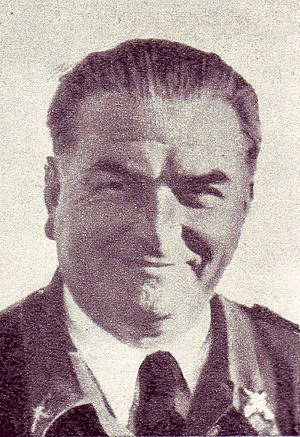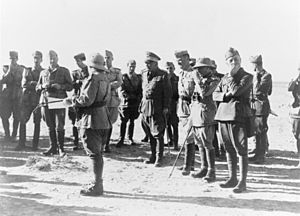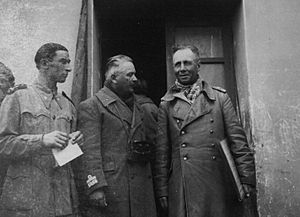Gastone Gambara facts for kids
Quick facts for kids
Gastone Gambara
|
|
|---|---|
 |
|
| Born | 10 November 1890 Imola, Kingdom of Italy |
| Died | 27 February 1962 (aged 71) Rome, Italy |
| Allegiance | |
| Service/ |
Royal Italian Army National Republican Army Italian Army |
| Rank | Lieutenant general |
| Commands held | Corpo Truppe Volontarie XV Army Corps VIII Army Corps XX Army Corps XIX Army Corps XI Army Corps |
| Battles/wars | World War I:
|
Gastone Gambara (born November 10, 1890 – died February 27, 1962) was an Italian General. He was an important military leader during both World War I and World War II. He was especially known for his role in the Spanish Civil War. During World War II, he played a key part in the fighting in North Africa and in operations in Yugoslavia.
Contents
A Look at His Life
Early Military Career
Gastone Gambara was born in Imola, Italy. He started his military journey as a non-commissioned officer. Later, he graduated from the Military Academy of Modena. During World War I, he served with the Alpini, which are mountain infantry troops.
In June 1916, he was injured during a battle on Monte Cengio. This mountain is located on the Asiago plateau. In late 1916, he moved to the Macedonian front. He served with the 62nd Infantry Regiment "Sicilia." By March 1917, he returned to Italy. He then served on the Alpine front with the 6th Alpini Regiment. In 1918, he was promoted to Major for his bravery in war. He was also made commander of the 29th Regiment Arditi. Towards the end of the war, he received three Silver Medals for Military Valor.
Between the World Wars
After World War I, Gambara commanded the 18th Alpini Regiment. In the early 1920s, he held various important staff positions. He was the chief of staff for General Bastico during the Second Italo-Ethiopian War. For his efforts in this war, Gambara received the Knight's Cross of the Military Order of Savoy.
In February 1937, he was promoted to the rank of colonel. In November 1938, he became the commander of the Corpo Truppe Volontarie. This was the Italian group that fought in the Spanish Civil War. He led the Cuerpo de Ejercito Legionario during the Catalonia Offensive. He also led them during the final offensive of the Spanish Civil War. On March 30, his troops took control of Alicante. Gambara then served as the Italian ambassador to Spain from 1938 to 1940.
World War II Service
During World War II, Gastone Gambara fought in France, Yugoslavia, and Libya. He commanded the XV Army Corps during the Battle of France in 1940. He then led the VIII Army Corps during the Greco-Italian War in 1941.
During the Western Desert campaign in North Africa, Gambara became Chief of Staff of the High Command. He also commanded the Italian XX Army Corps. This corps included the 101st Motorized Division "Trieste" and the 132nd Armored Division "Ariete". The Ariete division had 137 M13/40 tanks.
The Italian XX Corps came under the command of German General Erwin Rommel in late November 1941. Rommel was impressed by the Italian units. He asked that Gambara's corps be placed under his control. Italian units under Gambara's command fought very well. By November 23, the Ariete division, with help from the Trieste and Savona Divisions, had damaged or destroyed many British tanks and vehicles.
On March 3, 1942, Gambara was replaced as Chief of Staff in North Africa. From December 1942, Gambara commanded the XI Army Corps. This corps was involved in operations against resistance groups in Slovenia. During this time, some camps where people were held saw many suffer from difficult conditions.
After the Kingdom of Italy joined the Allies, Gambara was appointed Chief of Staff of the National Republican Army. This was thanks to Rodolfo Graziani’s suggestion. On May 14, 1944, Gambara became ill. He was then replaced by Archimede Mischi.
After the War
In 1945, Gambara was held in an Allied POW camp at Coltano. In June 1945, he was discharged from the army. In 1947, Gambara moved to Spain after being invited by Francisco Franco. He returned to Italy in 1952. He passed away in Rome in 1962.
After the war, the Socialist Federal Republic of Yugoslavia tried to have Gambara sent to them for trial. However, he was never tried. The British government did not support these requests. They wanted to strengthen the new Italian government, which was against communism. Gambara's name was on a list of wanted individuals compiled by the Allies in 1947.
Awards and Honors
- Knight Grand Cross of the Order of the Crown of Italy
- Silver Medal of Military Valor
- War Merit Cross
- Commemorative Medal for the Italo-Austrian War 1915–1918
- Commemorative Medal of the Unity of Italy
- Allied Victory Medal
- Commemorative Medal for the Operations in the Italian East Africa, 1936-40
- Knight Grand Cross of the Sovereign Military Order of Malta in August 1939
- Iron Cross First and Second Class
See also
 In Spanish: Gastone Gambara para niños
In Spanish: Gastone Gambara para niños
 | Aaron Henry |
 | T. R. M. Howard |
 | Jesse Jackson |



